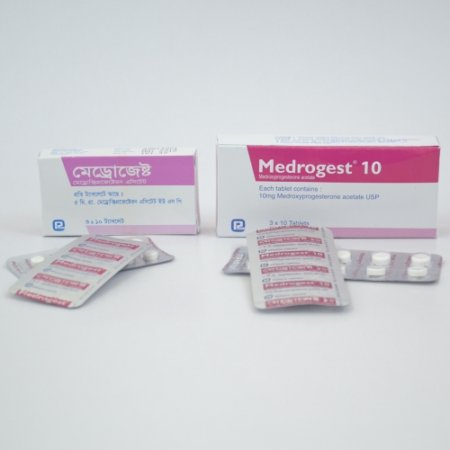
Type:10 Tablets
Generic Name:Medroxyprogesterone Acetate
Manufacturer:Renata Limited
Price:৳53.80
Menorrhagia, endometriosis, secondary amenorrhoea, contraception, abnormal uterine bleeding due to hormonal imbalance in the absence of organic pathology
May be taken with or without food. Incidence of minor indigestion may increase as dose increases. Take w/ meals if necessary.
Oral Amenorrhea, Uterine Bleeding Uterine bleeding: 5-10 mg/day PO for 5-10 days; beginning day 16 or 21 of the menstrual cycle; withdrawal bleeding may be expected within 3 to 7 days after discontinuing medroxyprogesterone Amenorrhea, secondary: 5-10 mg/day PO for 5-10 days; may be started at any time; withdrawal bleeding may be expected within 3-7 days after discontinuing medroxyprogesterone Reduction of endometrial hyperplasia: 5 or 10 mg daily for 12 to 14 consecutive days per month, in postmenopausal women receiving daily 0.625 mg conjugated estrogens, either beginning on the 1st day of the cycle or the 16th day of the cycle. Endometriosis: 10 mg three times a day for 90 consecutive days, beginning on the first day of the menstrual cycle Intramuscular Contraception 150 mg deep IM every 3 months The initial injection should be given during the first 5 days after the onset of a normal menstrual period; within 5 days post-partum if not breast-feeding; or if exclusively breast-feeding at or after six weeks post-partum.
Thromboembolic disorders; cerebral apoplexy; severe hepatic dysfunction; incomplete abortion, hormone-dependent carcinoma; Undiagnosed vaginal bleeding, Undiagnosed urinary tract bleeding, Known or suspected pregnancy, Undiagnosed breast pathology, Missed abortion, Active thromboembolic disorders, Markedly impaired liver function,
Medroxyprogesterone is a synthetic progestogen which converts the proliferative phase of the endometrium into secretory phase. It has some androgenic and anabolic activities but no oestrogenic effects. Parenteral use leads to inhibition of pituitary gonadotropins, thus preventing follicular maturation and ovulation.
Breakthrough bleeding is likely to occur in patients being treated for endometriosis. May cause some degree of fluid retention, conditions which might be influenced by this factor, such as epilepsy, migraine, asthma, or cardiac or renal dysfunction, require careful observation. A decrease in glucose tolerance has been observed in some patients. Patients with depression, DM, epilepsy, asthma, migraine, hypertension, renal or cardiac dysfunction. Monitor patient closely for loss of vision, proptosis, diplopia and thromboembolic disorders. Lactation: Safe
>10% Amenorrhea,Breakthrough bleeding,Change in menstrual flow,Spotting,Edema,Anorexia,Weakness,Pain at injection site Frequency Not Defined Angioedema,Change in weight,Depression,Dizziness,Headache,Nervousness,Somnolence,Breast tenderness,Galactorrhea,Abdominal pain,Nausea and vomiting,Cholestatic jaundice,Deep vein thrombosis (DVT),Thrombophlebitis Potentially Fatal: Thrombophlebitis and pulmonary embolism.
Aminoglutethimide and enzyme-inducing drugs (e.g. carbamazepine, griseofulvin, phenobarbital, rifampicin, phenytoin) may reduce plasma concentrations leading to reduced efficacy. Additional measures required when medroxyprogesterone is used for contraception during coadministration with these drugs.